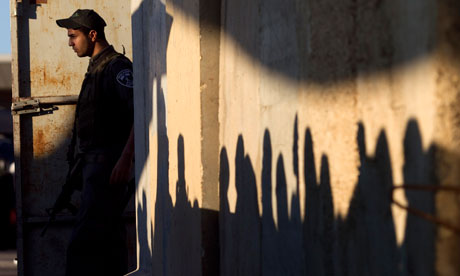
At PalFest, a literary festival in the West Bank, I knew we'd have to pass through Israeli checkpoints. What I hadn't expected was what the checkpoints would feel like. As foreigners we could have gone through on our bus. But PalFest wants writers to experience what it's like for ordinary Palestinians. And so it was that we found ourselves walking, single file, down narrow cages towards turnstiles.
In theory it might have been funny to watch writers struggling with their luggage – China Miéville trying a backward twist, or Tom Warner having to hoist his suitcase high above his head – but in reality it was humiliating. And that, I guess, is the point of the narrow corridor and the undersized turnstiles. The message – to us and the people who do this daily – is don't come back again.
As in most literary festivals we give readings – mine was in a beautiful garden in Ramallah accompanied by three musicians, whose haunting improvisations joined the pain of the old South Africa to the contemporary West Bank – and workshops. The rest of our time is spent not as per festival routine, in green rooms or shops, but listening to stories. And so it was that we visited Munther Fahmi's bookshop in east Jerusalem's American Colony Hotel.
Fahmi recently managed to overturn an Israeli court's judgment that he was not entitled to residency in Jerusalem. He's on probation now and unable to travel without permission, which came too late this year for the London Book Fair. "They're lousy losers," he says, "so they gave me a visa days after the fair had ended." Asked why, given all the difficulties he faces, he doesn't leave, he says simply: "I was born here. This is my country. You have to stay where you belong."
Fahmi's case was won with international help. Fatima Salim is not so lucky. Although her family have lived in the same house in the Sheikh Jarrah district of east Jerusalem for generations, a right-of-return law that applies only to Israeli citizens means she has been given an order to vacate. She has already lost the land that adjoined her property. Now she stands outside a house that is deteriorating because she is forbidden to fix it, and tells her story, her tears only leaking out at the end. All we writers we can do is be witness to this dignified old woman telling us that it might be better to be on the streets than to see her children persecuted because of where they live.
At most lit fests writers are there to be listened to. In this one, we are made silent by the pain of all we hear.

